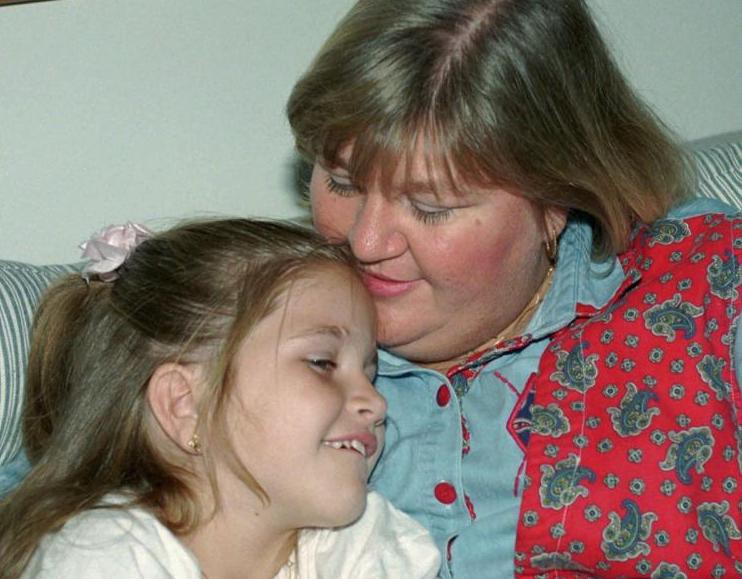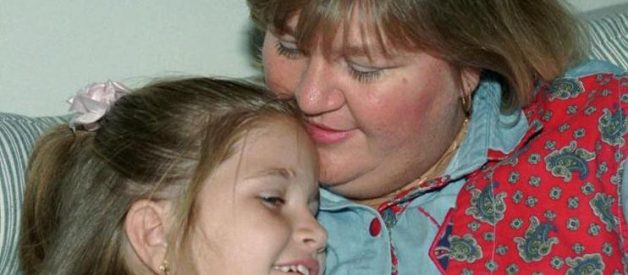
When Jennifer Bush was born in 1985, her mother, Kathy, called her ?a dream come true.? Kathy and her husband, Craig, already had two boys, and Kathy was elated to finally have a daughter.
At first, she seemed perfectly happy and healthy. But before too long, she began seeing the pediatrician with one illness after another: respiratory problems, ear infections, diarrhea. Her health seemed to be declining, but doctors couldn?t find an underlying cause.
They determined she had a rare immune disorder, which required her to have an IV. Because Jennifer was so small, and her veins so tiny, she had to have the IV pump implanted permanently into her chest.
But that didn?t seem to help. Jennifer?s health kept declining ? Kathy said she was now having seizures, severe abdominal pain, and couldn?t keep her food down. At 3, she was put on the anti-seizure drug Tegretol, which, in high doses, can itself cause seizures. By age 5, she had to have a feeding tube implanted into her stomach. At 7, she was diagnosed with a rare infection, polymicrobial sepsis.
Meanwhile, her mother, Kathy, quit her job ? but not to stay home with her increasingly ill daughter. Quitting her job caused her to lose her medical insurance, at the same time that they were racking up hundreds of thousands of dollars in medical bills.
Instead, Kathy took a job as an office manager at Jennifer?s pediatrician?s office, where she would have complete access to Jennifer?s doctor ? and her medical files.
To get help paying the medical bills, she reached out to various charities near their Coral Springs, Florida, home. The charities, and individual people, gave generously, and Jennifer ? a beautiful, smiley little girl ? soon became something of a local celebrity. She was featured on local TV and newspapers, rode in parades, and even got to meet the Florida Marlins baseball team.
Kathy became a devoted activist for healthcare reform. She and Jennifer even went to Washington, D.C., to meet with then-First Lady Hillary Rodham Clinton. Kathy frequently noted how she had to choose between groceries and medical bills, relying on charities and Medicaid for help.
At the same time, the family was taking resort vacations and buying a new motorcycle and sports car.
But in 1991, staff at the Coral Springs Medical Center, where Jennifer was a frequent patient, began seeing red flags: punctured or tampered IV lines, confusing and false statements about Jennifer?s symptoms and diagnoses, a constant push for more tests and procedures. They took their concerns to Dr. Eli Newberger.
After reviewing the staff?s concerns and Jennifer?s medical records, Newberger concluded that Kathy Bush might have Munchausen Syndrome by Proxy, or what?s now known as Factitious Disorder Imposed on Another. He believed this was the motivation behind what he believed were acts of medical abuse committed by Kathy on Jennifer. As a mandated reporter, he informed Child Protective Services of his concerns.
He also recommended that CSMC conduct their own investigation. However, the Bushes sued CSMC, so the hospital dropped their investigation.
Then in April 1995, an anonymous nurse at another hospital where Jennifer was a frequent patient contacted the child abuse hotline. She told them that she had observed some troubling things during Jennifer?s many stays there. She had seen Kathy tampering with Jennifer?s feeding tubes and IV lines, which would later malfunction. Jennifer would often have levels of drugs in her system that didn?t correspond with her prescribed dosages, along with drugs that she wasn?t prescribed. There were even times when her urine samples had clearly been switched with someone else?s.
The anonymous nurse also said she?d come to recognize a pattern with Jennifer: right before she was scheduled to be discharged, when she was happy and seemed to be recovering, the girl would suddenly suffer a seizure when nurses weren?t in the room. She?d go from being fine to pale, lethargic, and vomiting.
She also said Kathy treated her daughter as no more than a ?prop? for the media ? when she would be told that media were here to see Jennifer, she would make sure the girl was laying in bed (even if she had just been up and playing), with the maximum amount of tubes and wires, so she looked as sick as possible.
Most disturbingly, the nurse said that Kathy seemed to be almost ?euphoric? when her daughter would have a medical crisis. The nurse said she feared for Jennifer?s life.
This time, the tip was forwarded to Florida state prosecutors. Both CPS and prosecutors opened an investigation that lasted a year.
Through that investigation, they found several medical professionals who either witnessed Kathy tampering with her daughter?s treatments, or saw things in the little girl?s chart that raised suspicions.
One incident in particular stood out to investigators. After Jennifer had been prescribed Tegretol for seizures, the level of the drug in her bloodstream began to spike into near-lethal territory. So the doctor who prescribed it put a hold on it ? meaning it would not be given out from the pharmacy. Yet for three weeks afterwards, Jennifer?s Tegretol levels remained high, occasionally spiking to near-lethal levels again.
So on April 15, 1995, police arrested Kathy Bush and charged her with aggravated child abuse and Medicaid fraud.
Jennifer was taken from school that day and put in foster care. By this time, she had been hospitalized 200 times and undergone almost 40 surgeries ? including having her gallbladder, appendix, and part of her intestines removed ? as well as 1,819 non-surgical treatments. Yet soon after being taken out of her mother?s custody, Jennifer?s feeding tube was safely removed and her many illnesses and symptoms seemed to disappear.
Kathy Bush?s trial began July 20, 1999. Before the trial started, the judge dealt the prosecution a blow: he would not allow any testimony or evidence having to do with Munchausen Syndrome by Proxy. The diagnosis was still somewhat controversial (and still is). The prosecution would have to prove that Kathy had committed medical abuse on Jennifer, no more, no less.
Kathy?s defense was that she was simply a concerned mother doing everything in her power to care for her sick child. The accusations of medical abuse, she said, were just the doctors and nurses working together to exact revenge for her activism.
Prosecutors called dozens of doctors and medical professionals from hospitals all over the region who had treated Jennifer. They testified to patterns of mysterious symptoms that only Kathy witnessed, falsified medical histories and diagnoses, frequent tampering with medical equipment, drugs in Jennifer?s system that weren?t supposed to be there, and recurring infections consistent with contaminated feeding tubes or catheters ? some that could only be explained by the introduction of fecal matter.
They also testified to the multiple incidents where Jennifer would seem to recover, only to get worse once her mother visited her.
The doctor who was caring for her at the time of the trial also testified. Since being out of her mother?s care, she had been perfectly healthy; the only illness she had gotten was from a viral infection, which she recovered from.
Oct. 7, 1999, after seven hours, the jury returned a verdict of guilty. Kathy was sentenced to five years in prison followed by five years probation. At her final sentencing hearing, a CPS caseworker read a letter from Jennifer. In it, she says that when she thinks of her mother, she gets very angry, and that she has a lot of grief.
Kathy was taken to Gadsten Correctional Facility in Quincy, Florida. Since the State of Florida was pursuing a case to terminate Kathy?s parental rights to Jennifer, Kathy decided to voluntarily terminate her rights rather than drag her family through another ordeal.
She served three years before being granted parole in 2005.
But that is not where this story ends.
Though Kathy was prohibited from seeing Jennifer, in 2004, she began writing to her from prison. The two began corresponding by mail, with supervision by a therapist. Jennifer was being bounced around the foster-care system, an experience she describes as ?traumatic,? and having a stable connection to a loving mother must have been her lifeline.
When she turned 18, Jennifer requested that the prohibition against contact with her mother be lifted. It was granted. Now, at age 27, Jennifer is close with her mother and maintains that Kathy never abused her. She says her mother was a victim of hysteria, branded with the ?diagnosis du jour.?
She hasn?t given out any information on her current health condition, but she appears to be healthy and happy.


